We have established centers for management of Substance Abuse,
working on Community Psychiatry as well – Azra Fazal Pechho
Int. Conference on Psychosocial, Psychiatric Rehabilitation
KARACHI: Pakistan does not have enough qualified trained psychiatrists, hence clinical psychologists as well as Lady Health Workers should be trained to identify diseases like depression and anxiety early and refer these patients to appropriate facilities. This was stated by Madam Azra Fazal Pechho Sindh Health Minister while inaugurating the 2nd International Psychosocial and Psychiatric Rehabilitation conference organized by Karwan-e-Hayat held on December 20th and 21st 2024.
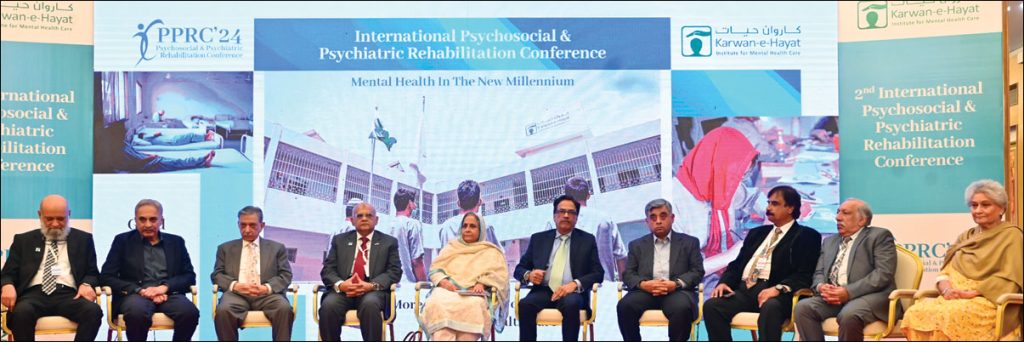
Karwan-e-Heyat organized its 2nd International Psychosocial and Psychiatric Rehabilitation conference in Karachi on December 20th and 21st 2024. Photograph taken in the inaugural session shows Dr. Ajmal Kazmi, Prof. Khalid Mufti, Dr. Minhaj Qidwai, Dr. Azra Pechho Sindh Health Minister, Mr. Salim, Brig. Shoaib, Prof. Mazhar Malik, Talat Tayabji and others.
Mental Health in the New Millennium was the theme of the conference which was largely attended by psychiatrists, clinical psychologists, social workers and others involved in psychiatric rehabilitation services. Tele-Psychiatric services, she opined, was a key and effective intervention whereby clinical psychologists can take care of these patients under the guidance of psychiatrists. Sindh Government, she said, has also established some centers for substance abuse and mental healthcare for women. Geopolitical crisis in the region has its impact and particularly the young generation is at risk of becoming radicalized. We are also working in the field of community psychiatry. Later she presented Life Time Achievement Awards to eminent Clinical Psychologist Madam Farrukh who has also trained a large number of psychologists, Prof. Imran Bashir Chaudhry, Prof. Khalid Mufti, Prof. Iqbal Afridi and Ms. Anis Haroon a human rights activist.

Earlier Mr. Muhammad Salim Chairman Board of Directors of Karwan-e-Hayat in his welcome address pointed out that this institution was established in 1983 and has been serving those in need of mental health care and prevention for the last forty years. It is a hundred bed facility looking after those suffering from various mental diseases. It has a busy OPD. KPT had provided the premises. We also have twenty two community based outreach camps and provide facilities at some District Hospitals. We are licensed by the Sindh Healthcare Commission and we are also working in close collaboration with the Government of Sindh to reduce stigma and help the marginalized people.

Dr. Azra Pechho Sindh Health Minister presenting Life Time Achievement Awards to Prof. Khalid Mufti, Prof. Iqbal Afridi, Prof. Imran Bashir Chaudhry during the 2nd International Psychosocial and Psychiatric Rehabilitation conference organized by Karwan-e-Heyat.
We promote holistic approaches to mental healthcare and patient’s rehabilitation, share evidence based practices and innovative strategies on the way forward, fostering collaboration and networking among stakeholders besides advocating policies and practices that support mental health projects, he added.

Prof. Khalid Mufti in his Keynote address on “Regional Conflicts Psych politics and Pakistan” referred to ongoing international conflicts in different parts of the world including Palestine, the unrest in Kashmir. All these conflicts have an impact. Young population is at risk of developing mental disorders as Violence and instability has its own impact. Conflict in Afghanistan has increased mental health disorders in the region and it has its impact in Paksitan as well. The younger generation gets radicalized. Human Rights violations creates chaos. Apart from Horizon an NGO that we run from Peshawar, Dr. Asma Humayun has also done lot of work in rehabilitation of APS female students. We have been working in Afghanistan in collaboration with WHO and trained many General Practitioners. Tele Psychiatry services are also used to help manage patients. He suggested that we need to develop community based mental health services, psychiatric First Aid, involvement of NGOs and Emergency Mental Healthcare crisis intervention.

Dr. Fizza Yasmeen, Prof. Qudisa Tariq and Prof. Wasdav Ammar. Chairing a session during the Psychosocial and Psychiatric Rehabilitation conference organized by Karwan-e-Heyat.
Nutrition Psychiatry
Prof. Iqbal Afridi was the other invited guest speaker who delivered his Keynote address. The topic of his presentation was “Transforming Mental Health through the emerging discipline of nutritional psychiatry”. He highlighted the importance of nutrition in psychiatry and now a new sub-specialty of Nutrition Psychiatry, he said, has been established. Diet, he said, plays an important role in the management of many diseases. Healthy eating has direct influence on brain and emotional wellbeing. He laid emphasis on quality of diet and personalized diet for patients. Food, he said, can also change the genetic vulnerability. He discussed in detail the brain gut connection. There are about five hundred million neurons in the brain. Healthy diet improves cognition. Diet is also very useful in neurogenerative disorders. Diet has a role in management of mental health, treatment and rehabilitation. Studies have showed that healthy diet delays neurodegenerative diseases. Mindful eating offers many advantages. Psychobiotics are also extremely useful in managing psychiatric disorders.

Dr. Minhaj Qidwai Chairman of the Organizing Committee of the conference welcomed the guest speakers and participants. He hoped that this event will provide a platform for thought provoking discussions, networking opportunities and sharing knowledge that will advance our collective understanding of client management considering psychosocial rehabilitation. He hoped that participates will engage in useful discussions during the sessions and we should encourage exchange of ideas at such forums.

Brig. Shoaib alongwith others chairing a session during the Psychosocial and Psychiatric Rehabilitation conference organized by Karwan-e-Heyat.
Prof. Ajmal Kazmi Co-Chairman of the organizing committee also briefly addressed the participants and thanked all those who graced the occasion with their presence and those in the pharma industry who extended valuable help and assistance in organizing the conference.
Scientific Session
Prof. Farooq Naeem was the first speaker in the session who made a presentation through Video link. His virtual presentation was on “Sufism based CBT”. Cognitive flexibility, he said, looks at the whole picture. There is a different between Heart and Spirit. While in the West it is happy while in East Contentment is preferred. Sufism believes that one should always follow the middle path, gives importance to Gratitude, Hope, Tolerance, Courage. Heart, he opined, is full of light. Love. Follow the middle path. Sufis followed simple teachings. With mindfulness and exercise concentration is energized. It is effective in stress management. Sufism also provides meaning and purpose of life. Sufism helps people grow and live in Peace, he concluded.

Dr. Uzma Ali from Institute of Psychology Karachi discussed Youth and Adolescent Mental Health with special reference to substance use and prevention. She pointed out that as per statistics in the Year 2022, nine hundred twenty million people were suffering from mental health disorders. Depression accounted for 39% of disability. One in twenty people suffer from mental health diseases. Suicide is the third leading cause of death in adolescents between the ages of 15-29 years. Discrimination, stigma, education difficulties, risk taking behaviour, depression, anxiety all lead to substance abuse. HIV and HCV is very common in those who use injectable substances. Certain drugs are also used. Use of Ice is very common and those who start using it in early age become addicts in adult life.
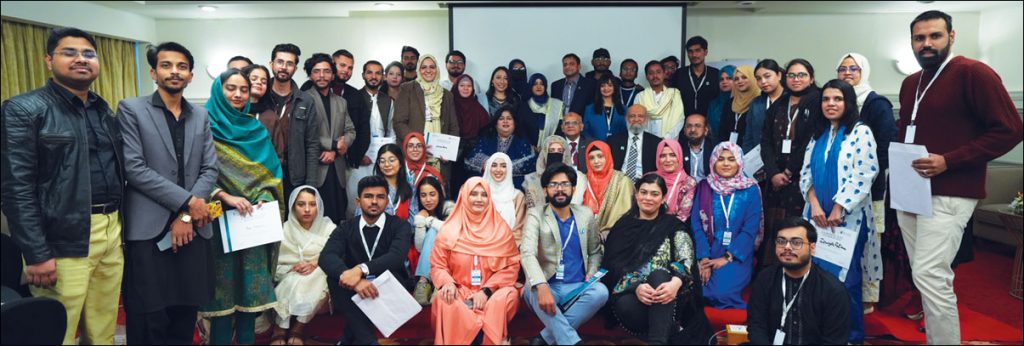
Some of the participants photographed during the Psychosocial
and Psychiatric Rehabilitation conference held at Karachi recently.
She laid emphasis on evidence based substance use prevention practices. Avoid or delay the use of substance abuse. Healthy and save development of children is important so that they can contribute to the society. Environment at school, family, workplace and developmental stages should be kept in mind while making any programme for prevention of substance use. It is also important that their good work should be appreciated. Programme designed for different age groups should be prepared. Provision of mental healthcare facilities at workplace should be preferred. Non interactive intervention programmes, she said, does not work. Drug safety alone does not work if no management strategy is planned, she remarked.
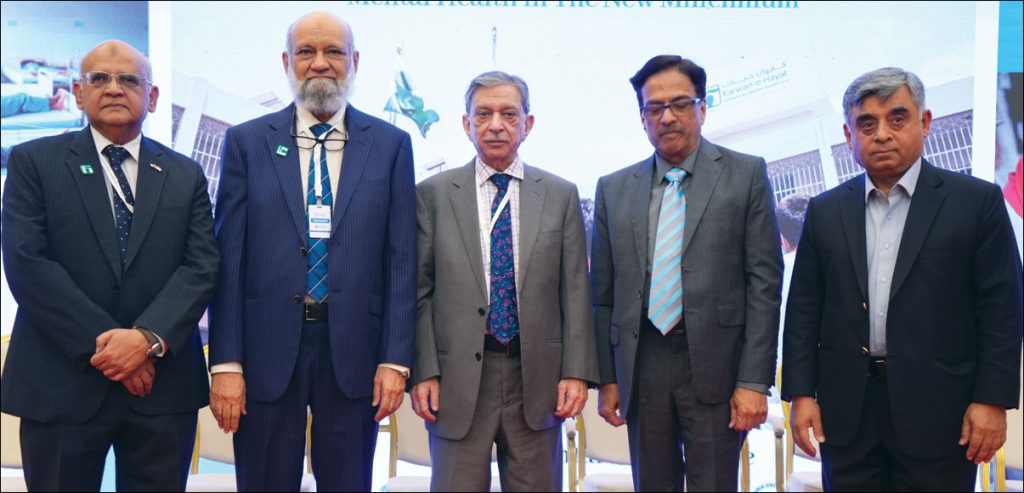
Photographed at the 2nd International Psychosocial and Psychiatric Rehabilitation conference organized by Karwan-e-Heyat from (L to R) are
Dr. Minhaj Qidwai, Dr. Ajmal Kazmi, Prof. Khalid Mufti, Mr. Muhammad Salim
and Mr. Yaqob Sattar.
Prof. Anila Amber Malik from Institute of Psychology, University of Karachi discussed Mental Health and Wellbeing at workplace. Safe and healthy working environment, she stated, improve staff relationship and it also improves productivity. If the staff enjoys working, the productivity will improve. Forced work load, long working hours, lack of control on job design also matters. Under or over production, inadequate pay, poor incentives and development, violence, harassment at workplace affects productivity. She advised that we should promote and protect mental health at workplace. Some can be allowed to work from home and they can return to work in office after improvement of their symptoms. Health and safety of employees should always be given preference. Her advice was talk about your feelings, eat well, drink safely, be mindful of your activities and manage your relationship, she added.
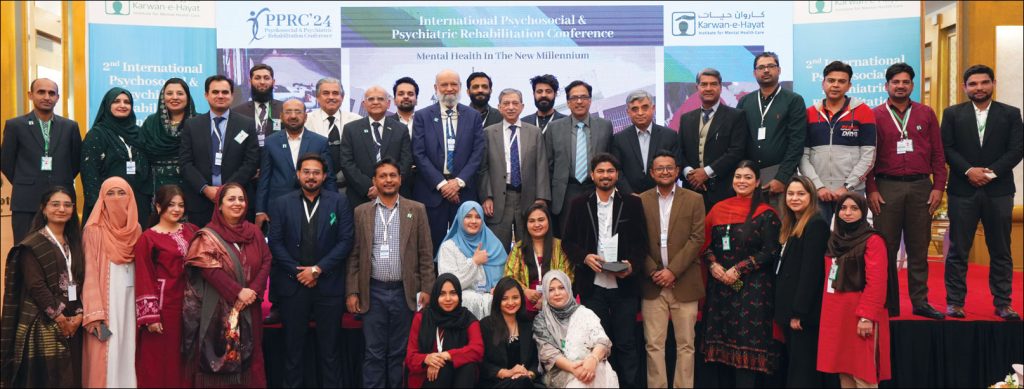
Group photograph shows some participants at the Psychosocial and
Psychiatric Rehabilitation conference held at Karachi recently.
Dr. Nasim Chaudhry discussed Integrated Rehabilitation Programmer Burns survivors in low resource setting with multicomponent approach. Burns, she said, leave scars on the victim’s personality as well. Almost 90% burns occur in Middle and Low Income countries. Young children suffer from fire in kitchen, old age also suffer from fire burns. It adversely affect the quality of life of the victims as well as other members of the family. She shared the details of a rehabilitation programme which they are running with the help of UK AID and NIHR. It is cost effective and consists of six work packages. She also disclosed that a National Registry of Burns is being established.

We will work with policy makers and every survivor will be eligible for intervention. We are working as Public Private Partnership and with engagement groups. We are having Focus Group Discussions. We try to find out the causes of burns and then plan intervention and protection. We have developed data collection tools. We have registered five hundred twenty patients so far. The programme is being implemented at twelve major Burn Centers in the country. National Institute of Health Research is also busy in capacity building, we have prepared a pictorial book which the burns patients will get at the Burn Centers. Capacity building of case manages is under progress.
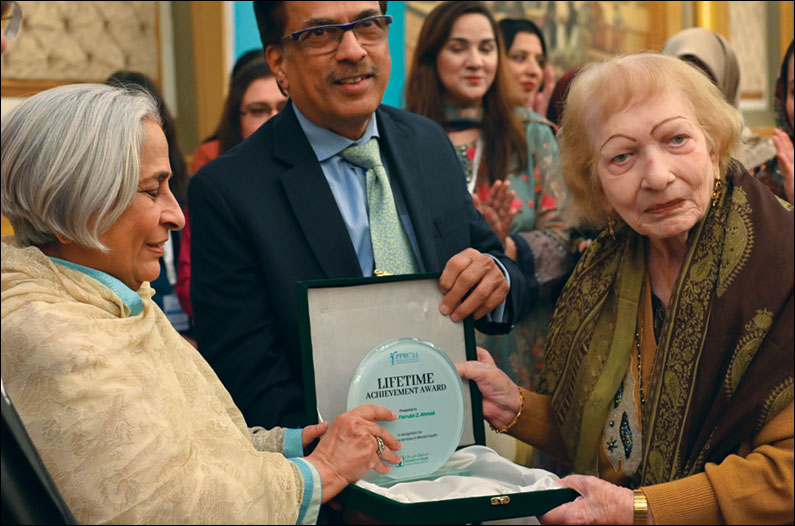
Dr. Azra Pechho Sindh Health Minister presenting Life Time Achievement Award to Prof. Farrakh an eminent clinical psychologist during the Psychosocial and Psychiatric Rehabilitation conference organized by Karwan-e-Heyat at Karachi last month.
Prof. Imran Bashir Chaudhry talked about affordable cardiac rehabilitation: An Outreach interdisciplinary Strategic Study. Fortunately lot of risk factors for cardiovascular diseases, he said, are modifiable. A number of other important topics in psychosocial rehabilitation were discussed by various speakers in different sessions and numerous of Pre-conference Workshops were also part of the scientific programme.




